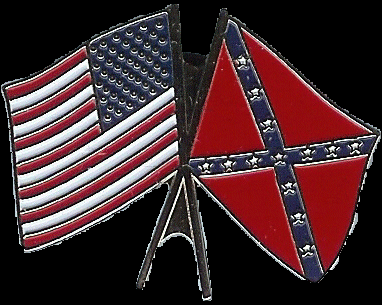
God Bless the United States of America

The Song of Dixie
"(I Wish I Was In) Dixie's Land"
By Daniel Decatur Emmett
I wish I was in land ob cotton,
Old times dar am not forgotten,
Look away! Look away! Look away! Dixie Land.
In Dixie Land whar' I was born in,
Early on one frosty mornin',
Look away! Look away! Look away! Dixie Land.
CHORUS:
Den I wish I was in Dixie, Hoo-ray! Hoo-ray!
In Dixie land, I'll take my stand to lib and die in Dixie;
Away, away, away down south in Dixie,
Away, away, away down south in Dixie.
Old Missus marry Will-de-weaber,
Willium was a gay deceaber; Look away! Look away! Look away! Dixie Land.
But when he put his arms around 'er
He smiled as fierce as a forty-pounder,
Look away! Look away! Look away! Dixie Land.
His face was sharp as a butcher's cleaber,
But dat did not seem to greab 'er;
Look away! Look away! Look away! Dixie Land.
Old Missus acted the foolish part,
And died for a man dat broke her heart,
Look away! Look away! Look away! Dixie Land.
Now here's a health to the next old Missus,
And all the gals dat want to kiss us;
Look away! Look away! Look away! Dixie Land.
But if you want to drive 'way sorrow,
Come and hear dis song to-morrow,
Look away! Look away! Look away! Dixie Land.
Dar's buckwheat cakes an' Injun batter,
Makes you fat or a little fatter;
Look away! Look away! Look away! Dixie Land.
Den hoe it down and scratch your grabble,
To Dixie's land I'm bound to trabble,
Look away! Look away! Look away! Dixie Land.
The original first verse performed on the song's premier, April 4, 1859:
I wish I was in the land of cotton,
'Simmon seed and sandy bottom;
Look away, look away, look away, Dixie's land.
In Dixie land, whar I was born in,
Early on a frosty mornin';
Look away, look away, look away, Dixie's land.
Confederate General Albert Pike thought these lyrics would be more
appropriate for Dixie as the Southern anthem:
Southrons Hear Your Country Call You
Words by Albert Pike
Southrons, hear your country call you!
Up, lest worse than death befall you!
To arms! To arms! To arms! In Dixie!
Lo! all the beacon fires are lighted
Let all hearts be now united!
To arms! To arms! To arms! In Dixie!
CHORUS:
Advance the flag of Dixie!
Hurrah! Hurrah!
For Dixie's Land we take our stand,
And live or die for Dixie!
To arms! To arms!
And conquer peace for Dixie!
Hear the Northern thunders mutter!
Northern flags in South winds flutter!
To arms! To arms! To arms! In Dixie!
Send them back your fierce defiance!
Stamp upon the cursed alliance!
To arms! To arms! To arms! In Dixie!
Fear no danger! Shun no labor!
Lift up rifle, pike, and sabre!
To arms! To arms! To arms! In Dixie!
Shoulder pressing close to shoulder,
Let the odds make each heart bolder!
To arms! To arms! To arms! In Dixie!
How the South's great heart rejoices
At your cannon's ringing voices!
To arms! To arms! To arms! In Dixie!
For faith betrayed and pledges broken,
Wrongs inflicted, insults spoken,
To arms! To arms! To arms! In Dixie!
Strong as lions, swift as eagles,
Back to their kennels hunt these beagles!
To arms! To arms! To arms! In Dixie!
Cut the unequal bond asunder!
Let them hence each other plunder!
To arms! To arms! To arms! In Dixie!
(Story by NPR) Nov. 11, 2002 -- "Dixie"
-- a song strongly identified with the South -- stirs emotion and exposes
timeworn rifts across American society.
It has been that way almost since "Dixie" was born in the days just before the
Civil War. Adopted as a Confederate anthem, it was offered up by President
Abraham Lincoln as a gesture of reconciliation after the war. It's accepted with
affection by many whites and scorned by many blacks. And yet it's been recorded
by everyone from Elvis Presley to the Robert Shaw chorale.
A search for the origins of the song prompts a gentler debate, but one that
touches many of the same themes. NPR's Cynthia Johnston sought to sort out the
story of "Dixie" for NPR's ongoing Present at the Creation series on
Morning Edition.
The song that provokes such contrasting responses also has more than one version
of its creation.
Authorship is credited to Daniel Decatur Emmett, a native of Mount Vernon, Ohio,
who was a member of a group called Bryant's Minstrels. But some believe "Dixie"
was really a tune passed on to Emmett by a pair of African-American brothers
born to parents who were slaves.
Emmett wrote such early American standards as "Turkey in the Straw" and
"Blue-Tail Fly." Johnston reports that in 1859, while Emmett was living and
performing in New York City, he was asked to write a new song. "Dixie" was the
result. A hit in New York, it caught on across the country within a year.
"Dixie" wasn't meant to be serious. It was a minstrel tune, performed in
blackface. But as war divided the nation, a song initially embraced by all sorts
of Americans -- including the man trying to preserve the union -- became more
and more identified with the South.
By 1862, the region had become popularly known as "Dixie," though a variety of
elements apart from the song may have influenced the nickname.
Despite its prompt association with the southern cause, "Dixie" remained one of
President Lincoln's favorite tunes. Historian Cheryl Thurber says the very day
the South surrendered, Lincoln asked a band to play "Dixie" for crowds gathered
outside the White House.
To many African-Americans, "Dixie" is a symbol of racism and slavery. Thomasina
Neely-Chandler, an ethnomusicologist and music professor at Spelman College in
Atlanta, says the important thing to remember is that "Dixie" is a harmful
misrepresentation of blacks.
"It's not the song or the text," Neely-Chandler says, "So much as how it's used
in a distorted way to present a particular people with an image that really
doesn't represent them."
In the years after the Civil War, "Dixie" was embraced by whites, but
increasingly rejected by blacks. The divide over the song deepened during the
early days of the civil rights movement.
"[Blacks] would sing a song like "We Shall Overcome" or "The Battle Hymn of the
Republic," University of Mississippi historian Charles Reagan Wilson says. "But
then opponents of integration and black rights would sing 'Dixie' as a kind of
counter-song asserting white privilege and white supremacy."
So the possibility that Emmett learned "Dixie" from Ben and Lew Snowden -- a
pair of black musicians he knew from his hometown -- carries its own irony. The
Snowdens' parents had been slaves in Maryland, but by the 1820s were living
outside Mount Vernon, Ohio, not far from where Dan Emmett's family lived.
Judith Sacks and her husband Howard, a professor of sociology at Kenyon College
in nearby Gambier, Ohio, wrote a book on the song's history called Way Up
North In Dixie. They say the Snowdens were well-known musicians who gave
concerts from a converted gable on the side of their house. The Sackses advance
the theory that the song "Dixie" is a childhood recollection from Mrs. Ellen
Snowden, the mother of Ben and Lew.
Judith and Howard Sacks acknowledge they have no explicit proof for their
assertion, and many scholars are skeptical, including Cheryl Thurber.
"Emmett did know the family," Thurber says. "He performed with them. But that
was in the 1890s" -- long after "Dixie" appeared.
Thurber does believe that the lyrics of "Dixie" embody a "slave idea of
paradise."
"This was an imaginary paradise," Thurber says, perhaps associated with a
community of runaway slaves. "Certainly the concept is one that Emmett did adopt
from African-American slaves."
Musician Mike Petee helped this year's crowd at Mount Vernon's Dan Emmett
festival imagine how Emmett might have been inspired to write the tune.
"It's New York City... It's rainy, it's cold," Petee said. "And what minstrels
loved to do was tour the north during the summer and in the winter they want to
go down south. So he's in the north, it's cold, it's dreary, his thoughts go to
Dixie, where he wants to be."
Beyond the differing theories of its origin and the quarrels over its symbolism,
it's clear to Vanderbilt University music historian Dale Cockrell why it became
so popular and enduring.
"The song's music is of undeniable infectious quality," Cockrell says. "It's
anthem-like. It's in 4/4 so it's a kind of propulsive march-like dance rhythm.
One can hardly help but be affected just by the musical quality of it."
A lot of people still wish they could hear "Dixie." But it's rarely sung in
public anymore.
One way latter-day performers try to make it acceptable is to combine it with
other tunes that acknowledge its complex history. Jazz singer Rene Marie
combined it with Billie Holliday's "Strange Fruit" -- a vivid depiction of a
lynching. Elvis Presley's American trilogy mixes "Dixie" with "The Battle Hymn
of the Republic" and the spiritual "All My Trials."
Howard Sacks believes "Dixie" retains a quintessential American quality:
"What it tells us is that black, white, male female, southern, northern, slave,
free, urban rural -- these aren't separate realms," Sacks says. "The story of
the American experience is the story of movement between these realms.
"Understanding the creation and re-creation of "Dixie" is that story
encapsulated in the words and music of a single song."
Star Points Up
During battle the flag was flown with the
center star pointing up, when the
battle required a retreat the flag was turned upside down as the southern
soldiers pulled back.
My Other Pages
Links To Some Interesting Pages
|
|
|
|
|
|
|
| BFC | On Rides | Mystery Fun House | Wonderland | Scotty's | Court of Flags |
Numerous videos
Guest Book
iPhone - iPod - iPad ready videos